Irresponsibilities On The Strategic Level: Questioning India’s Command And Control System – OpEd
When there is peace, the balance of the international system remains dependent upon the mercy of the most aggressive power. The notion is related to the theory of balance of power. One state, maximizing its influence and relative power capabilities, pushes other states into a security dilemma that keeps the system in balance.
But, states cannot anticipate intentions of each other. And the system remains dependent upon the aggression carried out by a hostile state. The world witnessed the phenomenon back when Napoleon’s France and Hitler’s Germany tried to shake the regional order in Europe. However, they were balanced out because of other power blocks like Russia and UK. theoretically, it can only be justified that an aggressive power needs to be balanced by creating different power blocks.
Alliance-making is the best tool to balance out an aggressor that covers bandwagoning, and strategic hedging also. Here in South Asia, two states have remained dominant so far when understanding regional political issues as India and Pakistan. With the change in the international system, strategic alliances around the world have favored strategic balance in South Asia tilting in India’s favor. The country has emerged as one of the strongest economies and is trying to expand its political influence abroad.
But this power maximization puts extra responsibilities on India also. It has to be extra careful in its policies not just towards the other regional countries but also inside. Recently, during a military exercise at Pokhran, three missiles were misfired by the Indian military. Missiles of 10-25 Km ranges were fired but they deviated from their actual path due to some technical errors, confirmed Indian officials. Kailash Vishnoi, Nachana Deputy Superintendent of Police also confirmed that the missiles were misfired during a military exercise that fell upon villages. The debris of two missiles was collected while the debris of the third missile was still missing. Indian military officials confirmed that the missiles were misfired, and they are looking into the miscalculations and technical errors. It has to be noted that a year earlier, in March 2022, there was a missile misfire from India that fell into a Pakistani city. Although there was no casualty recorded, the Brahmos missile was able to carry nuclear warheads. After conducting an investigation, India simply turned it into a miscalculation at the officers’ end and fired three Air Force officers. In two years it is the second incident of such mistakes at the strategic level in India.
Years earlier, India had been blaming Pakistan for helping out extremists in Kashmir and even termed Pakistan’s nuclear warheads as unsafe that could fall into these extremists’ hands. But such blunders at the top command and control level raise a certain question because negotiations like these are threats from other regional countries as well. That was the political wisdom on Pakistan’s end that it didn’t respond aggressively to the missile misfire in 2022. Otherwise, the event had the potential to lead to any limited conflict between the two countries. Secondly, India could have learned and should be behaving with extra precautions. But the recent incident has proven that India’s Command and Control system needs to be looked into. This is just a matter of good fate that no casualty has been recorded in both case. What if it could have fallen into a city and the same with these three missiles? Surely, it raises the question about the Indian use of such a sophisticated warhead that has the capability of massive damage.
The international community has remained less concerned about the previous incident and the current incident also. North Korea or Iran tests a missile and international media is all over covering it and portraying it as a negative setback that threatens world peace. But no major statement has been observed from any major power that can ask India and hold it accountable. If not other major power, at least regional countries must rise against such an irresponsible and threatening posture of India.
Pakistan has always raised such concerns at international forums. But the responsibility lies with all countries. What if such a missile falls in Nepal or any other regional country? So it concludes that India has to revisit its command and control system and the technology it is using in such a sophisticated weapon. Secondly, International and regional countries should ask India to behave responsibly to avoid threatening regional peace and stability. Any miscalculation of intention at the state level may lead to a disaster that needs to be considered with the utmost attention.

